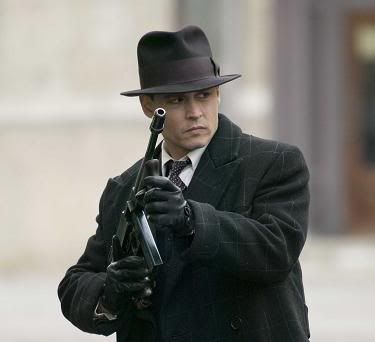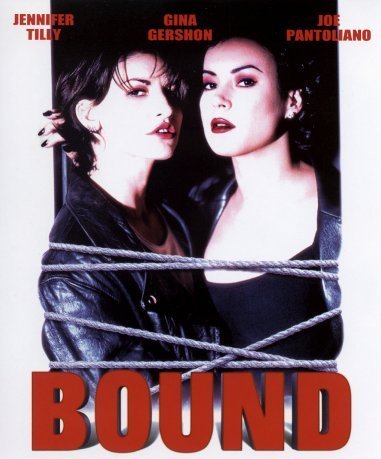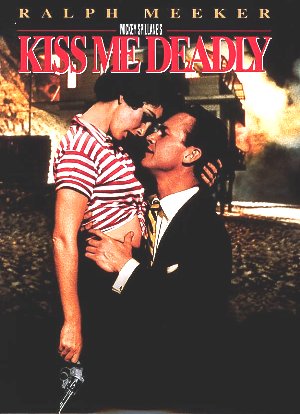Gunfight at the O.K. Corral (John Sturges, 1957)
+

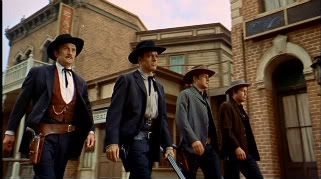
Sturges fashions Leon Uris's script into a taut, thinking-man's western with an exciting payoff in the title incident. Lancaster plays Wyatt Earp as something of an athletic saint but Douglas plays Doc Holliday full of self-loathing and self-destruction. The film is divided into two halves, the first where Earp is the marshal of Dodge City and the second where he quits to go help his brothers in their feud with the Clantons and McLowerys in Tombstone. The theme song by Frankie Laine sets everything up wonderfully over the opening credits and Dimitri Tiomkin's great music is an asset throughout, accenting the various tense incidents which fill out the movie. The supporting cast includes Rhonda Fleming as a lady gambler whom Earp romances and Jo Van Fleet as Doc's woman who runs off with Johnny Ringo (John Ireland) when Doc gets too ill from drink and TB. Other interesting casting choices include Dennis Hopper as Billy Clanton as well as DeForest Kelley (Bones on the original "
Star Trek") and Martin Milner ("
Adam-12") as two of Wyatt's brothers. Lyle Bettger, Ted de Corsia, Lee Van Cleef, Jack Elam, Frank Faylen and Earl Holliman round out the cast in my vote for the best O.K. Corral flick ever.
Diary of a Lost Girl (G.W. Pabst, 1929)


I find this far superior to Louise Brooks' more-famous film by Pabst,
Pandora's Box. That didn't really have the guts to
show all the sex and violence inherent in the story while this film is basically a sensory overload of such dimensions that it becomes one of the most erotic films ever made. Brooks' teenager Thymian is brought up in a home where her father throws out her governess when the latter becomes pregnant. Immediately, the father employs another, even-more-attractive governess, and Thymian falls victim to her father's partner, a pharmacist who rapes and impregnates her. When she refuses to marry the pharmacist, her baby is taken away and Thymian is sent to live in a reform school and after she escapes from there, she and her new friend find themselves working in a brothel. The sets, costumes and performances are all created to play up the exotic nature of unknown sex which later translates into a world of never-ending sensuality which seems to make it easier to survive in a world without any real love. Thymian doesn't really want to be a whore, but she's been abused so many times in her young life that it's almost comforting for awhile, at least until she learns better from a rich old man who seeks nothing but to treat her with fatherly affection. The resolution of the film makes it clear that despite it all, Thymian's heart is ultimately full of both wisdom and innocence, things not possessed by the socialites who try to help girls such as she. Louise Brooks is beautiful and heartbreaking in her presence and performance here.
Drag Me to Hell (Sam Raimi, 2009)
-


Raimi's return to [relatively] lower-budget horror flicks is pretty good for what it is, although I'll admit that somehow I'm now more used to believing in a flying spider-man than I am simple curses and seances. The film begins 40 years ago in an effective scene which is later reproduced after our heroine Christine (Alison Lohman) receives her curse which will cause her to be dragged down to hell in three days' time. Now, the question becomes does she deserve the curse and is she the heroine? She's quite likeable and attractive, but she does treat the old woman quite poorly in an attempt to climb the ladder at her bank job, even though her boss and co-worker seem to be dyed-in-the-wool jerks. On the other hand, the old woman seems to overreact a bit by immediately terrorizing and cursing her. Well, we wouldn't have a movie if she didn't. Much of the film seems inspired by the original
Nightmare on Elm Street in the way surrealism bleeds into everyday life, and Christine experiences things which no one else does, but then there are times when these violent, repulsive scenes become all too real and begin to affect others around her as well. I'd say the film was fair-to-middling, but it does get the benefit of the doubt from me because the last 15 minutes build up quite nicely to a definite "Gotcha" moment which makes much of the seeming craziness earlier on worth sitting through. Of course, I could be wrong since I basically don't watch "modern" horror films.
 Love in the Afternoon
Love in the Afternoon (Billy Wilder, 1957)
+

 Love in the Afternoon
Love in the Afternoon is a classic Billy Wilder romantic comedy which isn't mentioned as often as many of his other classics. There could be many reasons, including the fact that Gary Cooper appears to be too old to limn the dashing playboy in the film, but most people love Bogie's casting against type in Wilder's earlier
Sabrina. Perhaps younger audiences don't get all the jokes and references at the beginning and end of the film. Wilder, who always loved to use topical humor, has Audrey Hepburn's father, private detective Maurice Chevalier, narrate these scenes as if he were doing a Jack Webb/Joe Friday impression which is hilarious to Brenda and me but may mean nothing to others. There is also the fact that the film is all rather simple for a comedy which is over two hours long, but as usual with most very good films, it's all in the details.
The simplicity involves the fact that Hepburn's Ariane lives vicariously through her father's files which are all about other peoples' love affairs. One day, she tries to save the Cooper character from violence and becomes totally infatuated with him. The details here include that John McGiver (
Breakfast at Tiffany's) has a sparkling cameo as a husband who hires Chevalier and then wants to put several bullets into Cooper. One of the funniest things about this movie is that Cooper has a Hungarian quartet known as the Gypsies who play appropriate mood music for him, not only in his hotel suite, but in boats on a lake and in the sauna too. But perhaps the greatest detail which this film has (and one which tops the ending to
Sabrina) is that the actual ending is deeply-romantic and movingly-filmed by Wilder in what I would call one of his best-directed scenes ever.
The Innocents (Jack Clayton, 1961)

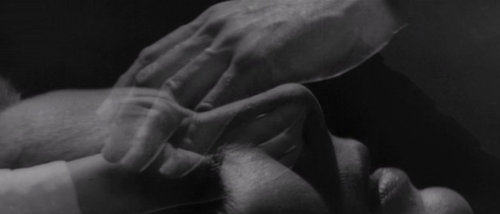
I've discussed this film many places around the site, including its own thread twice, so maybe this is overkill to mention it again, but I just watched it with someone who has never seen it, so I'll try to post something new and thoughtful, if I can. The bottom line for me is that this is the creepiest, scariest, most-unsettling horror film I've ever seen. It's far-more complex than
Drag Me to Hell which wears its scares on its sleeves.
The Innocents is so frightening because it's open to so many interpretations, and no matter which way you interpret it, it's just as disturbing as possible. It's based on Henry James'
The Turn of the Screw which tells the story of a new governess, Miss Giddens (Deborah Kerr), and her effect on two angelic children who seem to be far more mature than their ages would allow. The boy Miles (Martin Stephens) is sent home from school for being "an injury" to the other boys, and the girl Flora (Pamela Franklin) seems to realize that Miles is coming home before anyone else does. This is only the beginning of many incidents which seem to possibly have more than one explanation, and as the film progresses, it becomes more-difficult to decide what the truth of the situation is. The photography is spectacular and the sound design awesomely conveys what could either be Miss Giddens' deepening madness or a presence of unspeakable evil which threatens to possess and corrupt the children in the form of two dead servants who formally helped to raise the children while freely carrying on an open S&M sexual relationship in front of them. Since the film was made in 1961, you have to pay attention to pick up all the plot nuances and possibilities, but all you have to have are eyes and ears to be transfixed and lost in another world of a large house full of rooms of whispers and scary "games" of hide-and-seek. Make sure you watch this one after it gets dark.
Red River (Howard Hawks, 1948)


Spectacular western epic about the first cattle drive along the Chisholm Trail is actually a thinly-veiled retelling of
Mutiny on the Bounty. But years earlier, Thomas Dunson (John Wayne) breaks free from a wagon train with his longtime friend Groot (Walter Brennan), a wagon, a bull and some horses. Dunson tells his fiancee (Colleen Gray) to continue on with the train and that he'll send for her when he's ready. By the time the two men make it to the Red River in Texas, they realize that the wagons have been attacked by Indians. After the Indians attack them at night, young Matt arrives at their camp with a cow but he's half-crazy having witnessed the Indian attack on the wagon train before escaping. Years later, after the Civil War, Matt (played by Montgomery Clift as an adult) returns to help Dunson and Groot drive the herd of almost 10,000 cattle west to Missouri, although there are rumors that there's a railroad in Abilene, Kansas, which would eliminate the danger of Missouri raiders stealing the herd and killing the men. Dunson wants to take them to Missouri though and becomes despotic on the drive, causing many of the men to grumble and question his authority. Eventually, there is a mutiny and Dunson is left behind injured and embarrassed while Matt leads the herd to Abilene. Dunson vows to kill Matt once he recuperates and comes after him.
Red River is full of action, male bonding, Indian attacks, gunfights, fistfights and the recreation of a full-fledged cattle drive where all the principal actors actually are involved in transporting a huge herd. It's also a character study of a bitter man who hasn't reconciled himself to a new postwar world where he needs more help than he ever has before but is too proud to ask for it since it will make him seem weak. I'm not going to go into the details about the films ending which has been discussed here recently, except to say that it makes total sense to me and is the only ending I can think of which does in the light of the way the two main characters have been presented for over two hours of screen time. If you want to see a father kill his son in a western, go watch
The Big Country where it makes sense, but don't ask an epic western about the founding of a great cattle empire to end with one of the founders dead over a stubborn old man's misplaced sense of pride.
The Battle of Russia (Frank Capra & Anatole Litvak, 1943)


Part Five of the
Why We Fight series is the two-part
The Battle of Russia which not only explains the history of invasions into Russia during the 700 years leading up to WWII but goes into detail about the major battles of Moscow, Leningrad and Stalingrad where the Soviet army and strategy successfully repelled the Nazi invaders. Some early scenes even use Russian movies (
Alexander Nevsky) to show how the Russians have repulsed the Teutonic Knights, the Swedes, Napoleon and various others before the onslaught of Hitler's blitzkrieg. The strategy of falling back and strengthening each line of resistance is clearly explained as well as the Nazis need to invade several countries before entering Russia in order to get natural resources and land and sea bases from which to launch their attacks. The striking imagery of actual combat footage, combined with archival footage, special effects, cartoon graphics, quick editing and Dimitri Tiomkin's stirring Russian score all add up to an educational, yet fast-paced and entertaining dissection of current events almost at the time of their occurrence. This film is about par for the series although it does contain some of the more potent images, including a haunting one showing Russian villagers hanging along the Eastern Front as the Nazis retreat.

